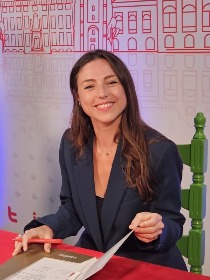Python, Linux, Whisper: Dragos Balan on how the MSc Speech Technology prepared him for the job market

Dragos Balan graduated from the MSc Speech Technology in October 2023. Today, he works as a Junior Researcher at the University of Twente. In this blog post, Dragos shares his experience with the programme and links it to how it prepared him for the position he currently holds.
How effectively does the programme align with the latest trends in the ST-industry, considering its direction and future developments (optional: specify how it aligns with research and/or other professional opportunities)?
I would say that the programme does a great job at aligning its content with the latest trends. Students spend the first semester learning about the basics of programming and linguistics which creates a solid foundation for the next block of the semester that tackles the earliest algorithms and methods of evaluation in the subfields of speech recognition (ASR) and speech synthesis (TTS). Lastly, the first block in the second semester covers the latest and most important work in the field, informing the students about the current state-of-the-art and, consequently, what gaps there are still that students could cover with their master thesis project in the last block of this programme.
In order to further align the programme with the VT-industry, there are often guest lectures with guests from various speech-related companies or from academia. These guest lectures are a great opportunity for students to learn about what the industry/academia is working on right now.
What practical, hands-on skills has the programme equipped you with that are directly applicable in the workplace?
Some of the skills that I can think of that this programme teaches are programming (mainly in Python and I value this skill the most as it is the means to answering research questions in our field), basics of linguistics which offer a better understanding of the differences and similarities between languages and how we perceive speech sounds, machine learning concepts commonly used in speech technology, such as LSTM and Attention mechanism (do not feel intimidated if you are not familiar with the terms – you will be after completing this programme!), ethics and responsible research which are very important if your research involves data gathering or evaluation from human participants (which often happens for speech synthesis model evaluation).
The particular skills that I am using at the moment as a junior researcher at Universiteit Twente are Python, Linux terminal commands, as well as knowledge about the state-of-the-art models in speech recognition, such as Whisper or wav2vec2. The fact that I have acquired this experience during my thesis greatly aids me with the tasks that I have at hand now. And, of course, how to research and find out whether your research question should be pursued or not is also a very important skill that I have refined during the programme.
Does the programme offer networking opportunities? If so, which ones (i.e. industry events, guest lectures, partnerships, alumni networks etc.)?
Yes, there were plenty of opportunities to connect and network with people from both industry and academia. The most important and accessible event was the ‘Dutch Speech Tech Day’, a 1-day conference where speech scientists and researchers from both industry and academia meet to exchange ideas and network with each other. There is also the Speech Technology Summer School, an event mainly meant to promote the VT programme, which happens on campus and includes guests from all around the world hosting demos and lectures.
There were also plenty of guest lectures that were quite informative in terms of what companies there are in this field and what they work on, as well as researchers from universities (for those who are interested in a PhD).
We got to interact with the previous cohort in one of the guest lectures from the company at which he works and personally I have visited Campus Fryslan as a graduate and presented the work I am currently doing, as well as my experience with the master, in hopes of inspiring and motivating the students of this cohort (and it was a relative success, which I am really happy about!)
Is there anything else that you would like to share with prospective students?
The programme is only in its 3rd year so far since it has been founded, so not everything is perfect, but each year there is an active effort done by the Speech Technology staff to improve the programme and make sure that both the students and teachers’ expectations are met. The more time passes, the more companies have become interested in interacting with the students of this master, so I encourage prospective students to apply for this master's as it is a unique experience with a specific focus on speech technology and there are lots of opportunities to network with the industry or academia.
About the author

Ciao! My name is Erika and I am the Content & Data Management Specialist of Campus Fryslân. I was born and raised in Italy and have recently graduated from the MSc in Climate Adaptation Governance. I have been in charge of the blog and all its content since October 2023. My aim is to make this virtual space serve as a logbook for the Campus Fryslân community and as a welcoming introduction for all newcomers. Here, you will find stories from the people of Campus Fryslân to get a taste of what studying here is like and the exciting opportunities it comes with!

